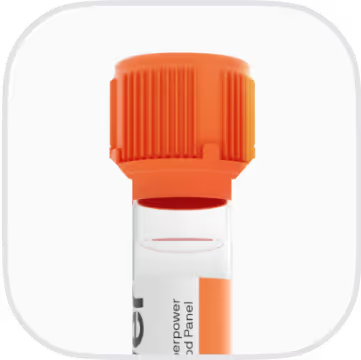What are Hyperthyroidism biomarkers
Blood testing for hyperthyroidism captures how fast the body’s thyroid engine is running and who is pressing the gas or the brakes. It measures circulating thyroid hormone (T4, thyroxine; T3, triiodothyronine), the brain’s control signal to the thyroid (TSH, thyroid‑stimulating hormone), and, when needed, immune signals that inappropriately push the gland (TRAb/TSI, TSH receptor antibodies/thyroid‑stimulating immunoglobulins). Together, these biomarkers show whether the bloodstream is flooded with thyroid hormone, whether the pituitary has tried to slow the gland by lowering its signal, and whether an autoimmune driver is at work (Graves’ disease) versus hormone spill from inflammation (thyroiditis) or an overactive nodule. They trace the circuit from controller (pituitary) to producer (thyroid) to effect on tissues (metabolic rate, heart rhythm, heat production), turning symptoms like palpitations and weight loss into a clear biological story. They also provide a starting point to follow treatment, showing when the system is moving back toward steady, responsive feedback.
Why is blood testing for Hyperthyroidism important?
- Confirm an overactive thyroid; low TSH with high T4 indicates hyperthyroidism.
- Spot hormone overdrive; Free T4 Index and T3 uptake reflect elevated active hormone.
- Clarify causes of palpitations, heat intolerance, anxiety, weight loss, and tremor.
- Guide treatment urgency; very low TSH with high T4 signals faster intervention.
- Flag autoimmune thyroid disease; TPO or Tg antibodies support an immune-driven cause.
- Differentiate causes; absent antibodies prompt evaluation for nodules, thyroiditis, or medication effects.
- Protect fertility and pregnancy; timely control reduces miscarriage, preterm birth, and complications.
- Track treatment response; TSH and T4 trends confirm control and guide dose adjustments.
What insights will I get?
Hyperthyroidism blood testing provides a window into how your thyroid gland is influencing nearly every system in your body. The thyroid acts as a metabolic control center, affecting energy production, heart rate, temperature regulation, cognitive function, reproductive health, and immune balance. At Superpower, we assess hyperthyroidism using these biomarkers: TSH (typically decreased), Free T4 Index (increased), Total T4 (increased), T3 Uptake (increased), and thyroid antibodies TPO Ab and Tg Ab.
TSH, or thyroid-stimulating hormone, is produced by the pituitary gland to signal the thyroid. In hyperthyroidism, TSH drops because the thyroid is already overactive. Free T4 Index and Total T4 measure the main thyroid hormone in circulation; both rise when the thyroid is producing too much hormone. T3 Uptake reflects how much thyroid hormone is available and tends to increase in hyperthyroidism. TPO Ab (thyroid peroxidase antibody) and Tg Ab (thyroglobulin antibody) are markers of immune activity against the thyroid, often elevated in autoimmune causes of hyperthyroidism like Graves’ disease.
When TSH is low and thyroid hormones are high, it signals that the body’s metabolic engine is running too fast. This can disrupt the stability of many systems—leading to symptoms like rapid heartbeat, heat intolerance, anxiety, and changes in menstrual cycles. The presence of thyroid antibodies points to immune system involvement, which can affect the course and stability of thyroid function over time.
Interpretation of these results depends on context. Pregnancy, age, acute illness, certain medications, and even lab assay differences can influence thyroid hormone levels and antibody results. These factors are important to consider for an accurate understanding of thyroid health.







.avif)



.svg)





.svg)


.svg)


.svg)

.avif)
.svg)










.avif)
.avif)
.avif)


.avif)
.avif)




.svg)




.avif)


